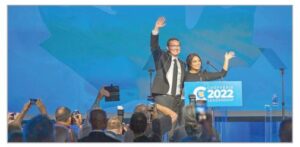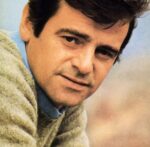Change is in the air: the Conservatives certainly hope so

TORONTO – In the 1960s, frequently referred to as the golden age of popular music in Western societies, there was no shortage of songs whose lyrics aimed at having the listeners reflect of the ‘human condition’ and the wistful failure of ideologies to produce the Utopia they espoused. It was not all grim.
What does that have to do with politics. Just about everything. Sergio Endrigo (in the pic below), a refugee from Istria (a pre–World War II Italian province in what is now Slovenia and Croatia, thanks to some ethnic cleansing by former Yugoslavian dictator Tito), better known as songwriter/singer of romantic ballads, captured the sum of the post-war delusions in a seminal work “La Ballata dell’Ex”.
In poetic form, it captures the impressions of a partisan who returns from the brutal guerilla warfare and partakes in the disarmament of post-war Italy because “Ci son nell’aria grandi novità”, he thought, in a famous line. “Mi chiamano Danilo e sono qua” he explained to the authorities.
Pierre Poilievre struck me as the modern-day Danilo when he stepped on the stage and said, it’s over and here I am. Conservative partisans must have had those expectant and defying lyrics ringing in their ears when the final results of the Leadership campaign were announced.
Why not? The internal war is definitely over. It was the only time in living memory that a single candidate has received close to 69% of the popular vote in a contest – on the first ballot no less. That should augur well for party unity in the election sometime down the road.
Other party strategists will note from easily accessible/attainable Conservative Party electoral maps the crushing presence of the Pierre Poilievre Machine. It swept all but thirty constituency associations of the total 338 in play and won all but eight of the total. The second-place candidate, Jean Charest, received the support of barely 16% of the Conservative membership.
The opposing parties may well hope that the electorate will see Pierre Poilievre through a different lens. If they are wrong, the next federal election will be a “change election”. One suspects that the Poilievre machine has already figured out the mechanics. They are actively recruiting in Canada’s ethno-cultural and religious communities. Over seven million Canadians speak a language other than English or French. But the ‘French fact’ is still very much a part of the Canadian political landscape.
An Albertan by birth, he began his “acceptance speech” in French, a ‘tip of the hat’ to his ancestry and in recognition of the Quebec [French] nation. The attacks against the opposing parties were direct yet subtle: Conservatives are against wokism and incompetence in government. As if to drive home the point, he began (and ended) his brief announcement by kissing his wife and talking about his pre-school children.
It is a reassuring formula used by those who know they must put doubters at ease. As Endrigo sang: Un mondo tutto nuovo sorgerà. That’s what a contemporary Danilo, Pierre Poilievre, promised. A trusting Danilo won the war and lost the peace. I don’t think Poilievre wants to suffer the same delusion. Poilievre is in complete control of his Party and its destiny. Both are his to succeed or muck up.




